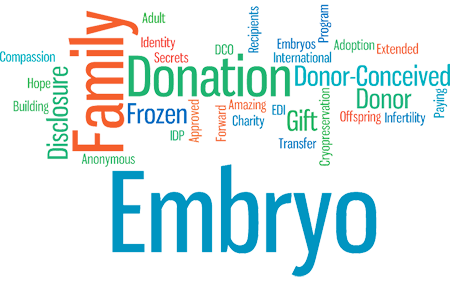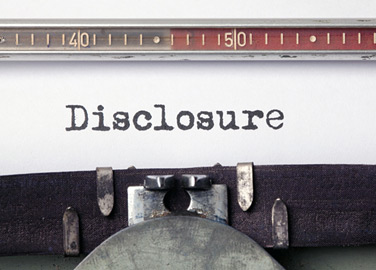IDP™Embryo Recipient Identity Disclosure Program (IDP™)
What will be our disclosure decisions? Is the IDP available to all embryo donation procedures performed at EDI? Embryo Donors will decide if they will participate in the IDP? Will the embryo donor ever be given our contact information? Why would embryo donors agree to participate in the IDP? Why would I want to disclose the genetic origins to our DCO? Are there potential disadvantages to participating in the IDP? Will the embryo donors have any legal rights or responsibilities towards the DCO? Will our contact with the embryo donors be sustained over time? Will we always be able to contact the embryo donor? Can the embryo donors change their minds and not participate in the IDP? Can we contact the embryo donors before the DCO reaches the age the embryo donors stipulated? Are there extra fees associated with the IDP? What happens if Embryo Donation International closes? Links to additional information: Introduction:Some embryo recipients choose to tell friends and family about conceiving a child through embryo donation while others prefer to keep the information private. Recently, there has also been a trend towards telling the donor-conceived offspring (DCO) their origin. As you might expect, they are often curious about their donors. We here at Embryo Donation International, P.L., (EDI) believe that disclosure to the donor-conceived offspring may be ideal for many families but not necessarily all. To give embryo donors, embryo recipients and the DCO's a choice, we developed the embryo recipient Identity Disclosure Program (IDP). Below are some common questions that embryo recipients may ask themselves in trying to decide if they would somehow want to connect with the donors or, perhaps more importantly, how the DCO would feel about the donors:
The IDP allows for current anonymity to be maintained between the embryo donors and you, the embryo recipients. You, as the parents of the DCO, ultimately decide IF disclosure is to take place as well as WHEN contact between the embryo donors and the DCO may occur within the confines of the embryo donor's agreement. [We apologize to our single embryo recipients (i.e., without a partner) as the materials below are written in the plural form. Placing both "I" and "we" in the information below makes it difficult to read.] What will be our disclosure decisions?In general, you will be faced with three different decisions regarding disclosure to the DCO:
All embryo recipients receiving embryos through EDI will have the ability to disclose items 1 and 2 above to the DCO using the detailed information available within the embryo donor profile originally provided to you. With the IDP, there is now a potential third option:
It is this third disclosure option involving the release of embryo donor identifying information that is the focus of this supplemental program. 
Is the IDP available to all embryo donation procedures performed at EDI?Remember there are three main embryo donation alternatives here at EDI. The embryos may be donated anonymously, in an approved fashion or in an open embryo donation procedure. Anonymous Embryo Donation Approved Embryo Donation Open Embryo Donation The embryo donor IDP is available in the anonymous and approved embryo donation procedures. Embryo donors will decide if they will participate in the IDP.Identifying information will be provided when (only one option will be chosen)...
Some MHP's recommend that disclosure regarding the origin of the DCO be initiated as early as the child is able to comprehend. If left beyond age ten, the children may experience feelings of mistrust and alienation. You may certainly disclose the DCO's origin to them at anytime but you will only have access to the embryo donor's identifying information when the DCO reaches the age agreed upon by the embryo donors. Skilled MHP's will be available to you upon request to guide you through this process. Yet another important facet of the IDP is the decision by EDI to have contact possible before the DCO reaches age 18. Some sperm and egg donation programs encourage contact after age 18 but, if we are really creating the IDP for the good of the child, it seems quite clear that allowing contact earlier than age 18 may be ideal for the health and wellbeing of the DCO. If I choose to receive donated embryos with the IDP option, do we have to disclose the origin to our DCO?Unless there are legal documents stating otherwise, such as in an open embryo donation procedure, the decision to disclose the origin of the DCO to them is entirely yours. You may accept embryos donated with the IDP option but choose to never disclose. The IDP option provides you the opportunity to disclose the identity of the donors to the DCO if you feel it is best to do so. The actual contact with the embryo donors can take place no earlier than the DCO age requirements as outlined by the embryo donors. Will the embryo donor ever be given our contact information?Identifying information about your family, including the DCO, will NOT be released to the embryo donors without express permission from you. It is common to provide identifying information about you, the embryo recipients and perhaps the DCO when contact is made but that decision is yours or the decision of the adult DCO. 
Why would embryo donors agree to participate in the IDP?Below are some of the common reasons why the embryo donors may want to participate in the IDP:
Always remember the embryo donors are not the DCO's parents - you are. Research suggests that the DCO's desire to connect with the donors does not in any way compromise the existing relationship between you and your child. Studies suggest that their love for you doesn't change after the connection to the donor's family. The IDP does not in any way create parental or family relationships between the embryo donors and the DCO. Your parenting rights will not be at risk. Why would I want to disclose the genetic origins to our DCO?There are numerous reasons one might want to disclose the origin of an embryo DCO:
Learning more about the embryo donors and their genetic siblings Are there potential disadvantages to participating in the IDP?If any indication, many adoptions used to be a secret but the adoptee's strong desires to know of their origin eventually changed many perspectives and state statutes. Eventually, the adopted gained access to their birth information upon reaching age 18. Many of those adoptees, as well as MHP's, would agree that access to identifying information regarding the adoptee's origin is a fundamental right and an important step to understanding one's self. Some eventual unifications of the adoptee's and their genetic parents went beautifully while others did not always go so well. The adoption literature may not necessarily pertain to the embryo donation model, so final outcomes remain uncertain. What literature we have thus far suggests the relationships between the DCO's and the embryo donors are healthy, your parent-child relationship with the DCO remains absolutely intact and that the DCO may emotionally benefit from the knowledge about the embryo donor family. Long-term research is still being collected regarding the outcome of identity disclosure and numerous questions have yet to be answered. Will the embryo donors have any legal rights or responsibilities towards the DCO?In cases of open embryo donation where the parties know each other from the start, the donors clearly release their legal obligations to the recipients as is outlined in the contracts. We also feel that in the anonymous and approved embryo donation procedures, the "Florida Stature 742.14" (shortened ink: http://bit.ly/1icKd71) clearly protect the anonymous embryo donors and embryo recipients. Embryo donors participating in the IDP will have no legal relationship, rights, responsibilities or obligations to any offspring born using their donated embryos as is discussed in the embryo donor and embryo recipient EDI consents and is further based upon Florida law. The lack of a legal relationship between the embryo donors and the DCO is again emphasized in the IDP consent/contract. Registering all DCO at birth is mandatory 
How will we obtain the identifying information and exactly what information will be provided through the IDP?Before releasing any identifying information regarding your embryo donors, we contact the donors and ask them the following:
The potential method of contact may include but not necessarily be limited to phone, text, email or letter. Once we receive the preferred method of contact, we will then forward this to the embryo recipient family or the adult DCO. When you first choose your embryo donor, there was a great deal of information provided to you regarding their medical, ethnic, social and educational backgrounds. It is expected that you will have kept this information safe. If available and specifically requested, EDI will provide this same information understanding that archived materials may no longer be available or in the format that would make them easily accessible. A separate administrative fee may be charged to the embryo recipients or adult DCO to produce these documents. If the embryo donors do not reply to EDI's request within 90 days of our first attempt to contact them or within 90 days of the embryo recipient's/adult DCO's direct request for contact (documentation of attempted contact with date stamp will need to be provided to EDI), EDI will release our most recent contact and identifying information to the embryo recipients/adult DCO including name, most recent address, phone number and other pertinent information. Lastly, if contact is made but true identifying information is not ever exchanged, when the DCO is 18 years of age or older, we will provide the DCO the identifying information as discussed above. This default release of information makes EDI's Identity Disclosure Program a true commitment to all the participants involved. With this information now available to you or the DCO, tracking the embryo donors down through the Internet or by hiring a private investigator should be feasible. Florida state laws require that our medical records be kept for at least seven years. The Federal Drug Administration requires that medical records involving donated material be kept for 10 years. EDI commits to keeping the records longer than 10 years but necessarily indefinitely. Remember that no record collection system is not without risk for loss. Paper records can be destroyed in flood or fire and electronic records can be also be destroyed in natural and unnatural disasters. Programs that do not acknowledge the potential effects of natural and man made disasters are not divulging the realistic difficulties of sustained record retention over extended periods of time. Therefore, an absolute guarantee of providing the identifying information to you or the adult DCO cannot be given. Still, EDI does commit to providing you or the adult DCO, to the best of our ability, our most up-to-date identifying information about the embryo donors. Will our contact with the embryo donors be sustained over time?In the original consent/contract as part of the IDP, the embryo donors agreed to at least a single contact with the embryo recipients or adult DCO. Any future contact will be decided by mutual consent of all parties. Will we always be able to contact the embryo donor?EDI has asked that the embryo donors keep their contact information up-to-date with us but there is no certainty that this will have taken place. The accuracy of the information we provide will be dependent on the diligence of the embryo donors. The embryo donor may also refuse contact in spite of the commitment to allow it. Most donors are very agreeable to contact with the embryo recipients or adult DCO but no guarantee can be provided by EDI that contact will actually take place. For example, there is no way to be absolutely certain the donors will be alive when contact is desired, so clearly contact cannot be assured. Does contact with the embryo donor assure us that we will meet those individuals whose DNA created the embryos?One of the most common groups of individuals who donate their embryos may have themselves received assistance through donated eggs and/or sperm. Commonly, the embryo donors will have contributed either their eggs or sperm to create the embryos but not necessarily both. As a result, contacting the embryo donors may yield some information about the donors but not necessarily all information desired by the embryo recipients or adult DCO. Contact with other egg and/or sperm donors cannot be assured. Keep in mind, though, that genetic siblings often still exist in the embryo donor's family and the DCO may still very much want to connect with them. Can the embryo donors change their minds and not participate in the IDP?Once agreements are signed, the embryo donors may not change their mind. They are also not allowed to increase the age of the DCO at which contact may take place. If the embryo donors voluntarily contact EDI stating that they would like to be available for contact earlier than previously agreed upon, new contracts or addendums will be signed and the embryo recipients appraised of this decision. This doesn't mean that you have to disclose earlier but simply gives you the option to do so. Even if the embryo donors don't respond to your or the adult DCO's request for contact (i.e., seem to have changed their minds), our most up-to-date identifying information will be released after 90 days have passed following your documented first attempt to contact them or when the DCO reaches 18 years of age or older. 
Can we contact the embryo donors before the DCO reaches the age the embryo donors stipulated?The simple answer is "no." EDI will adhere to the consent/contract as previously agreed. EDI will NOT ask the embryo donors to allow for earlier contact simply because the embryo recipients and/or DCO would like to have it. We feel the act of asking itself could be interpreted as trying to apply inappropriate pressure on the embryo donors. There are a few potential emergency exceptions regarding a request for earlier contact that we will take under consideration. These might include, but not necessarily be limited to, the following:
In the examples above, we will contact the embryo donors, explain the circumstances and urge that contact be considered earlier than expected. We are unable to foresee all possibilities wherein an exception to the consent/contract would be considered. Even with these important exceptions, EDI cannot guarantee that the embryo donors will agree to contact. The choice will be theirs and theirs alone. Are there extra fees associated with the IDP?Administrative costs for EDI are significantly higher with the IDP. EDI must maintain contact with the embryo donors for extended periods of time, well beyond the original embryo transfer. Additional time is also required of the staff to educate all parties and to help set up the initial contact years after the original donation and extended record retention can be quite expensive. Please see the price list for additional information regarding these fees. There will be no extra fees charged when it comes time for the embryo recipients or adult DCO to obtain the identifying information except if archived materials have to be copied as discussed previously. Embryo donors will not receive any financial reimbursement for participation in the IDP, as the decision must be made purely on a voluntary basis without any form of enticement. Any fees for the IDP are paid for by you, the embryo recipients. 
What happens if Embryo Donation International closes?Since many medical practices close or merge with other practices, it is possible that EDI will do the same in the years ahead. This is essentially true of all medical practices. If this does occur, EDI will transfer the records to a specific facility and attempt to notify both embryo donors and recipient families of the transfer of records. Please rest assured that your records will be handled with the utmost of confidentiality and care.
Links to additional information:Below are some links that you may find interesting regarding disclosure and the IDP process itself: Disclosure Issues in Embryo Donation: Summary Comments (linked to http://www.embryodonationblog.com/464/disclosure-issues-in-embryo-donation-summary-comments/] |
||
|
|
|







